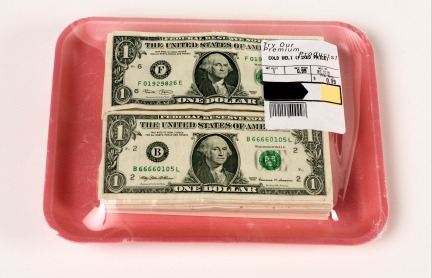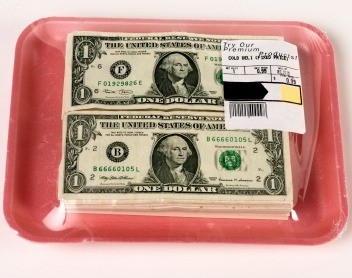 Buying sustainable pork shouldn’t involve breaking the piggy bank.A couple of years ago at a farmers market, a woman approached my stall, a little apprehensively. She looked old and beaten down. Her face was weathered and worn. Her hands looked rough and gritty. But, it was clear that she was younger than she looked. Her clothes were poor. Her jeans were worn thin around the knees and had faded spots of dirt here and there on her thighs. Before she even said a word, I imagined a life of hard work and hard times for her.
Buying sustainable pork shouldn’t involve breaking the piggy bank.A couple of years ago at a farmers market, a woman approached my stall, a little apprehensively. She looked old and beaten down. Her face was weathered and worn. Her hands looked rough and gritty. But, it was clear that she was younger than she looked. Her clothes were poor. Her jeans were worn thin around the knees and had faded spots of dirt here and there on her thighs. Before she even said a word, I imagined a life of hard work and hard times for her.
She came over to the stall and without looking up at me started looking over the meat case, and then after a moment, she fingered the edge of the price sheet for a moment and then picked it up to take a closer look.
As she looked, I waited, without saying anything, wondering how things were going to go. I had long ago stopped stereotyping people. Yes, I had imagined a hard life for her, but that didn’t mean that she wasn’t willing to pay half a day’s wages on pasture-raised, local pork, or grassfed lamb. I’d been surprised by too many people to make that mistake again.
She carefully placed the price sheet back on the table and placed the small orange wee-bee little pumpkin paper weight back on top of it.
Then for the first time, she looked up at me. I smiled.
“Hi,” I said.
“Hello,” she said, and then as we looked at each other silently for a moment, I was taken very much by surprise. Her eyes quickly welled up with tears; one slipped out and slid slowly down her cheek. She raised a hand up and wiped it off. “I’m sorry,” she said.
“Don’t worry about it,” I replied.
“It’s just … it’s just that I am so frustrated.”
I didn’t say anything. It was clear that she wanted to speak her piece.
After a moment, still with tear-filled eyes, she said, “You know, I want … ,” she wiped another tear away, ” … I want so badly to stop eating grocery store meat. It’s terrible. Terrible for you. It tastes terrible. It’s all full of crap, hormones, drugs, and God knows what.”
I nodded.
“But this,” she said, sweeping a hand over the meat case, “I just can’t afford it, any of it.”
“I’m sorry,” I said, a little uncomfortable and slightly embarrassed. I looked away from her, around the rest of the farmers market. The people at the market were not monolithically well off, or white. It was not just soccer moms and exuberant well-off foodies. But, it was close.
I didn’t know what to say. I had often been confronted by people over the price of my meat. “That’s ridiculous!” “So expensive!” “Phhftt!” One old lady even said, “you should be ashamed!” Little did she know that I already was, always had been.
I had set out in farming with a mission, to offer ethically and ecologically raised meat at the lowest price possible, low enough even for people like the woman standing in front of me at that moment. But, I quickly discovered that this was a pipe dream. I couldn’t sell pork chops for less than $7.00/lb. and keep the farm going, and even at that price, my wife would still need to continue subsidizing the farm.
The low-volume, direct market system makes it impossible. The costs are simply too high. USDA slaughter and butchering alone doubles the cost of getting the animal to market. A lamb has $3.00/lb. of small-scale, local slaughter and butchering in it! A pig, $2.00/lb.
The woman standing in front of me had no idea how angry and frustrated I was. She had no idea that her tears were my tears. I had set out to make meat broadly affordable, but instead, I was selling exclusive, high-priced meat to the well-off.
As she stood in front of me, we were both pissed off, but I didn’t let on. She was the one crying.
“I’ve heard so many good things about local meat, but I’ve never even been able to try it,” she went on. “I’ve heard it tastes better, it’s better for you.” Her eyes were drying up.
“It does,” I said, “and it is.”
She looked at me.
Without thinking about it, I reached into the meat case and pulled out a package of two center cut pork chops and placed them in a paper bag. I folded the top of the bag over itself a couple of times and held the package out in the space between us.
“Here,” I said, “I want you to have this. You should at least get to try it.”
“No,” she said, taking a half a step backwards. “I can’t just take it.”
“It’s okay, really. I want you to have it.”
“No.” She took another half a step backward.
I was about to lose her.
“OK, wait,” I said, holding up my free hand to keep her from walking away. “How about this. Take the chops. Try them. If you like them, then you can come back and pay me whatever you can afford. Does that work?”
She took a step forward, returning to our shared space. I continued to hold the paper bag out between us.
“OK,” she said, reaching out to take the bag. She took the bag from me. “OK,” she said, “thanks.”
“No problem.”
“I’ll be back,” she said, “I will.”
“I know,” I replied.
She turned and walked away.
The next week, just as I finished up handing some change to a customer, I looked up and there she was, holding a $10 bill out towards me.
“That’s more than they cost,” I said.
“I know,” she said. “I don’t care, they were awesome.”
“Keep it,” I said, “I wanted you to have them.”
“No,” she said, “take it,” in such a way that I knew I had better just take the money, so I did.
“Let me get you some change,” I said, opening the cash box.
“No,” she said, raising her hands up to her shoulders, arms bent at the elbows, hands palm out, taking a step back and starting to turn. “Keep it,” and then she walked away.
I closed the cash box and watched her walk away.
In spite of the fact that my interaction with that woman has been a driving force in my desire to scale up the farm so that I could be in a position where economies of scale would make it possible for me to lower the cost of my meat, I have failed miserably. Yes, now I raise over 400 pigs per year, but the meat is not any cheaper. In fact, because most of it is marketed through a butcher shop in Chelsea Market, it is even more expensive. But, I haven’t given up yet.
I believe I have an ethical obligation to find a way to provide real food security for people of limited means. Nobody should have to cry because they can’t afford real food, which is one of the reasons I want to sell my pork in Price Chopper.
Of course, real food security is not only about developing infrastructures to make it possible to get local meat into supermarkets like Price Chopper. There is cultural work to do as well, including changing the “race to the bottom” supermarket mentality. Supermarket executives and managers need to be convinced of the value of supporting farmers by paying decent prices for non-industrial meat, and in turn, taking less of a profit margin to keep the prices down to help provide real food security. That is asking a lot of large corporations acting in competitive markets.
Is it too much to ask? The corporate mantra is that all that corporations do is give customers what they are asking for. So, let’s call them on it. Let’s start asking for broadly affordable local/regional meat that supports our local/regional farmers by compensating them fairly.
No more tears. Real food security is an ethical imperative.



